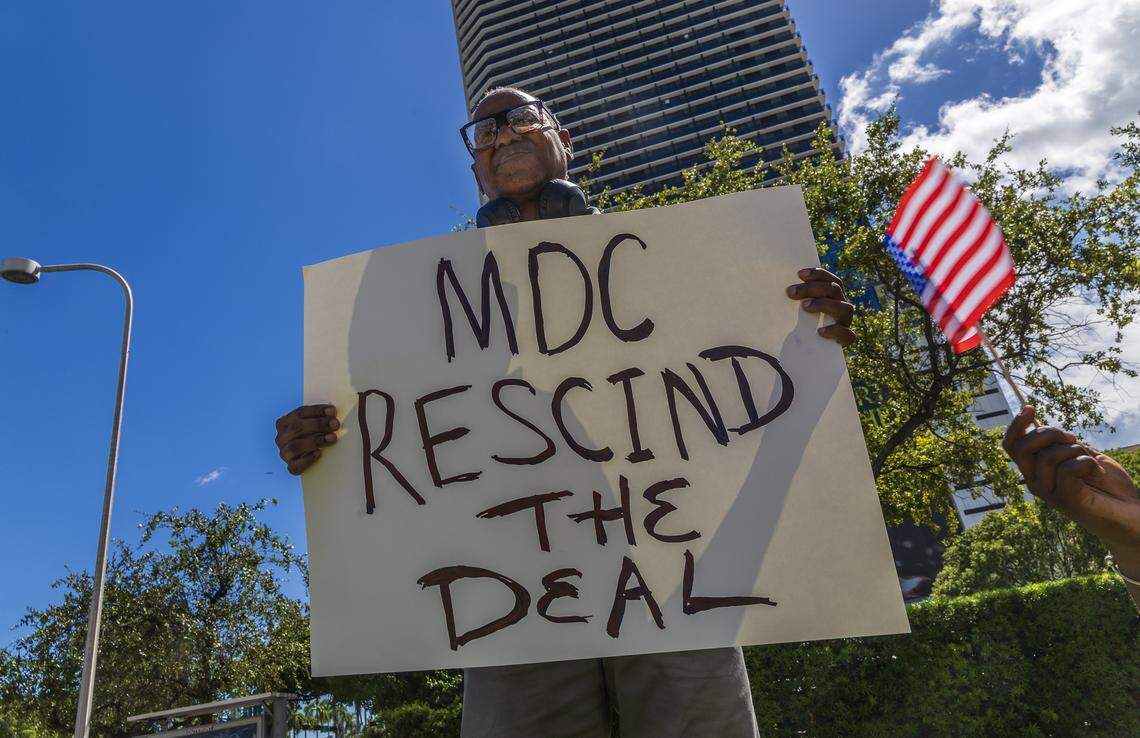A Miami-Dade Circuit Court judge on Tuesday blocked Miami Dade College from transferring property to the state for Donald Trump’s presidential library, ensuring the school keeps the land in its possession until the court issues a final verdict in a lawsuit alleging the institution violated Florida law when its trustees voted to give away prime downtown land.
The move marks the first major hurdle for Trump’s plans to build a high-rise library in downtown Miami adjacent to the Freedom Tower, which have otherwise swept through two government boards unanimously with no debate or discussion.
The school now has two options: Its Board of Trustees can hold a new, publicly noticed meeting to discuss the transfer of the land, the remedy sought by the plaintiff, historian Marvin Dunn. A recent poll found the deal to be locally unpopular, even among Republicans.
Or the college’s attorneys can continue to argue in court that its September notice about a Board of Trustees meeting to “discuss potential real estate transactions” was sufficient notice to the public of its plans under Florida’s Sunshine law.
During hearings on Monday afternoon and Tuesday evening, the college’s attorneys argued that Florida’s Sunshine law only requires notification, not specifics about the purpose of a public meeting.
But the judge disagreed, ruling that there is a likelihood that Dunn will win the case, and declaring that the college can’t give up the land in the meantime.
“The court does not believe that the notice was reasonable,” Judge Mavel Ruiz said after a two-hour hearing Tuesday evening.
The trustees voted during the Sept. 23 meeting to transfer the 2.6 acres the college purchased for $25 million in 2004 to a state board at no cost. The vice chair of the Board of Trustees said he had not received confirmation of the state’s plans for the land, and records provided by the College show the trustees had not been provided any additional materials about the deal before voting.
The state board, made up of Florida Gov. Ron DeSantis and the Florida Cabinet, voted to give the land to Trump’s presidential library foundation a week later, with the only condition being that construction begin within five years.
The college’s attorneys argued that the case was politically motivated, drawing on Dunn’s past social media posts critical of Trump, at one point suggesting that one of Dunn’s posts presented a “threat to the president’s life.”
“Of course not, that’s ridiculous. I resent that. I respect the law, I thoroughly resent that. How dare you suggest that of me?” Dunn said in one of the more heated moments of Tuesday’s hearing.
“It’s irrelevant,” Judge Ruiz interjected. “What is relevant here is whether the notice was sufficient to inform the public.”
She did, however, in issuing the plaintiff’s requested temporary injunction leave wiggle room to be swayed before she makes a final decision on the alleged Sunshine law violation. She noted that she had thought the law was more detailed than she now thinks it is after hearing the college’s case.
“This court’s surprised with the minimal requirement for reasonable notice that the Sunshine law really provides. So for that reason, this court struggled with whether or not this disclosure was sufficient,” Ruiz said.
The college’s attorneys also argued that it was already public information that the site was under consideration for Trump’s presidential library. The Miami Herald reported in June that Trump’s team had visited the site as a potential location.
But presidential library plans were shrouded in secrecy in the days leading up to the September board meeting. The college did not respond to requests from the Herald the day prior to the meeting about whether the land to be transferred was related to presidential library plans the day before.
Mayor Francis Suarez later told the Herald that while college president Madeline Pumariega had kept him in the loop about the plans, he was “kind of sworn to secrecy until it was announced.”
The college has considered development proposals for the downtown land – which it’s currently using as a parking lot – twice before. During 2016 negotiations, the college had requested a cultural center, $20 million in cash and a portion of condo sales before the deal eventually fell apart.
This time around, the college received a letter from DeSantis’ office requesting the land on Sept. 16, the school’s attorney told the judge Tuesday, and the Board of Trustees handed it over with no debate a week later.

